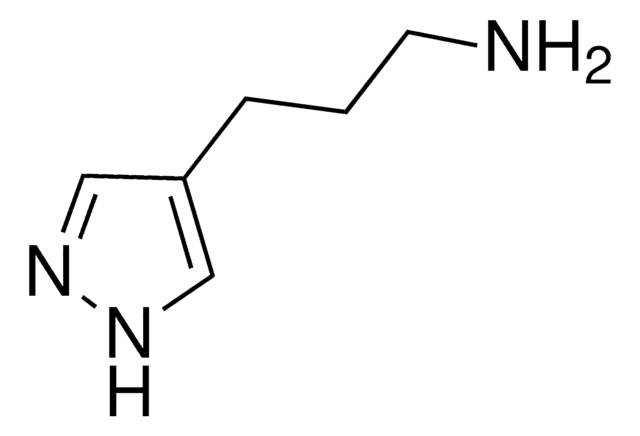All Photos(1)
About This Item
Empirical Formula (Hill Notation):
C16H18N4O4
CAS Number:
Molecular Weight:
330.34
Colour Index Number:
11130
EC Number:
MDL number:
UNSPSC Code:
12352103
PubChem Substance ID:
NACRES:
NA.23
Recommended Products
form
powder
Quality Level
composition
Dye content, 97%
mp
>300 °C (lit.)
λmax
495 nm
SMILES string
OCCN(CCO)c1ccc(cc1)\N=N\c2ccc(cc2)[N+]([O-])=O
InChI
1S/C16H18N4O4/c21-11-9-19(10-12-22)15-5-1-13(2-6-15)17-18-14-3-7-16(8-4-14)20(23)24/h1-8,21-22H,9-12H2/b18-17+
InChI key
GHDZRIQTRDZCMV-ISLYRVAYSA-N
General description
Disperse Red 19 (DR19) is widely used as a non-linear optical (NLO) dye with two hydroxyl (OH) groups, which can covalently connect with the base polymer. It can be linked as a side chain group that provides thermal and photo stability to the polymeric unit.
Application
DR19 can be used as red side groups in an NLO polyester for potential application in optical switching devices. It can also be bonded with polyurethane to form stable films, which may be used in the fabrication of analog systems.
Signal Word
Warning
Hazard Statements
Precautionary Statements
Hazard Classifications
Acute Tox. 4 Oral - Skin Sens. 1
Storage Class Code
11 - Combustible Solids
WGK
WGK 3
Flash Point(F)
Not applicable
Flash Point(C)
Not applicable
Choose from one of the most recent versions:
Already Own This Product?
Find documentation for the products that you have recently purchased in the Document Library.
Customers Also Viewed
Diacetylene-containing polymers. XIII. Poly (hexa-2, 4-diynylene-l, 6-dioxydicinnamates) containing an azo dye, Disperse Red 19
Miura H and Ogawa T
Polymer Bull., 49(2-3), 103-110 (2002)
New third-order nonlinear polymers functionalized with disperse red and disperse orange chromophores with increased stability
Cherioux, F., Audebert, P., Maillotte, H., Grossard, L., Hernandez, F. E., & Lacourt, A.
Chemistry of Materials, 9(12), 2921-2927 (1997)
Large photoinduced birefringence in an optically nonlinear polyester polymer
Shi Y, et al.
Applied Physics Letters, 59(23), 2935-2937 (1991)
Thermosetting nonlinear optical polymer: Polyurethane with disperse red 19 side groups
Shi Y, et al.
Applied Physics Letters, 60(21), 2577-2579 (1992)
A Galvan-Gonzalez et al.
Optics letters, 24(23), 1741-1743 (2007-12-15)
The photodegradation of the azobenzene chromophore DR1 {4-[N-ethyl-N-(2-hydroxyethyl)amino]-4(?)-nitroazobenzene]} incorporated as a side chain or as a guest in a poly(methyl) methacrylate host has been evaluated as a function of wavelength, temperature, and the atmospheric environment. The effects of these variables
Our team of scientists has experience in all areas of research including Life Science, Material Science, Chemical Synthesis, Chromatography, Analytical and many others.
Contact Technical Service










![Poly[(methyl methacrylate)-co-(Disperse Red 1 methacrylate)]](/deepweb/assets/sigmaaldrich/product/structures/370/635/3aaa8cfa-2018-4b33-a3f5-42fe0f2b921b/640/3aaa8cfa-2018-4b33-a3f5-42fe0f2b921b.png)